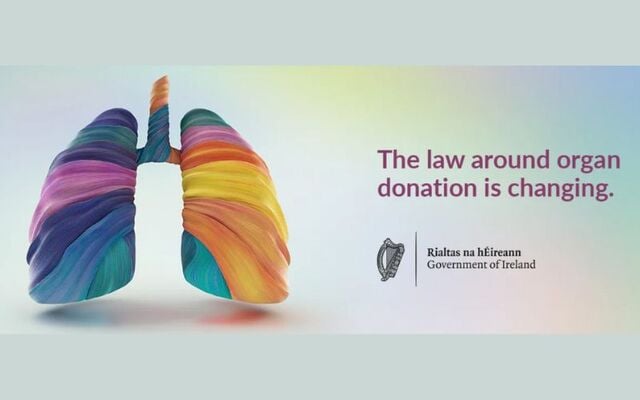Ireland's new 'soft opt-out system' for organ donation under the Human Tissue Act 2024 Part 2 commences today, Tuesday, June 17.
"Under this new legislation, all adults in Ireland will be considered to have agreed to be an organ donor when they die, unless they have recorded a decision not to donate on the National Organ Donation Opt-Out Register or are in one of the excluded groups," Ireland's Health Service Executive (HSE) said on Tuesday.
This is commonly referred to as a soft opt-out organ donation system.
Family members will always be consulted before any action is taken, and if they do not agree, then the donation will not proceed, the HSE noted.
Those who do not wish to donate their organs, for whatever reason, and have recorded their objection on the new National Organ Donation Opt-Out Register, will have their wishes respected, and their family will not be approached on the issue of organ donation.
The HSE said the Act also provides a framework for living donation and will, for the first time, provide a way for people who wish to donate a kidney to someone they don’t personally know, the opportunity to do so. This is known as non-directed altruistic donation. They are donating an organ for someone on a waiting list who needs it.
The law on organ donation in Ireland has changed. If you’re aged 18 or over, you’ll be considered a potential organ donor, unless you opt out or are part of an excluded group.
If you do not wish to become a donor, you can choose to opt out by adding your name to the opt-out… pic.twitter.com/2HLGlOU5qn
— HSE Ireland (@HSELive) June 17, 2025
"The opt-out organ donation system will bring us in line with international best practice," Dr. Colm Henry, CCO, HSE, said on Tuesday.
"Organ transplantation is one of the great advances in modern medicine. It offers a second chance at life to people with life-threatening illnesses or injuries to their vital organs.
"'Every year, more than 200 people in Ireland have their lives improved or saved by the gift of organ donation.
"At any given time, approximately 600 people in Ireland are on waiting lists for organ transplants.
"I encourage you to have a conversation with your family or next of kin and let them know your wishes around organ donation.”
Also commenting, Dr. Brian O'Brien, National Director, HSE Organ Donation Transplant Ireland, said: "Not everyone who dies is a potential organ donor. A donor needs to be in hospital and on a life support machine. All organs donated go to people most in need of a transplant. Consent is at the heart of this change.
"When someone dies, their family must agree to donate their organs. It is important to inform your family and friends about your decision regarding organ donation, as they will always be consulted, and your wishes should be central to any decision.
"The Act sets out who is considered a 'designated family member,' and this is usually the family member who has been the main point of contact for clinicians in their treatment of the deceased. This is the person who has to provide consent to the organ donation.
"If no consent is received or no designated family member is found, then the donation will not proceed.’’
Read more
Announcing the imminent commencement of the legislation last month, Ireland's Minister for Health Jennifer Carroll MacNeill said the change “respects donors’ wishes” while creating new pathways to save lives.
“In commencing this part of the Act, we are providing, for the first time, a national legislative framework for donation and transplantation services in Ireland,” Minister Carroll MacNeill said.
“This is a significant moment for healthcare in Ireland, and respecting potential donors' wishes will be fundamental to it. Family members will always be consulted before any action is taken.”
Opting out
The soft opt-out system will apply to adults aged 18 and over and covers five “relevant organs”: the liver, lungs, the pancreas, the heart, and kidneys.
Individuals who do not wish to become organ donors must register their decision with the HSE’s Opt-Out Register. If listed, no request will be made of their family at the time of death.
This legislative change comes during Organ Donor Awareness Week and ties in with this year’s theme, Don’t Leave Your Loved Ones in Doubt.
Minister Carroll MacNeill urged people to have conversations with family members: “Do take the time to talk with your family about organ donation and make sure that your choices will be known and respected.
"Your decision can make a life-changing difference for others.”
"Historic moment"
Activist and cystic fibrosis advocate Orla Tinsley, who received a double lung transplant in 2017, welcomed the change in an interview with RTÉ News.
“This is a historic moment. We have waited years for this kind of legislation to come through in Ireland,” Tinsley said.
“It gives people like me—people who were once on the edge of life—a new chance.”
Tinsley emphasized the importance of family communication: “Even with an opt-out system, families are consulted. The key is to make your wishes known. Talk about it. Because one conversation can be the difference between life and death for someone on the list.”

Cystic fibrosis advocate Orla Tinsley.
The phased rollout of the Human Tissue Act will eventually cover additional areas such as post-mortem procedures, anatomical examinations, and public display of bodies. For now, the focus remains on increasing organ availability while upholding consent as the cornerstone of practice.
For more information or to register your decision, visit Gov.ie/organdonation.




Comments